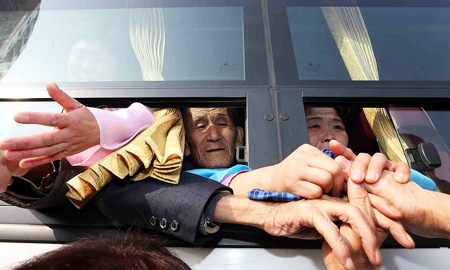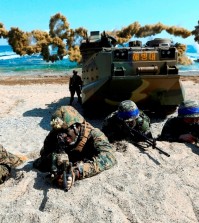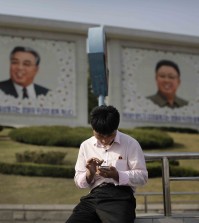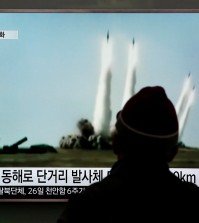- California Assembly OKs highest minimum wage in nation
- S. Korea unveils first graphic cigarette warnings
- US joins with South Korea, Japan in bid to deter North Korea
- LPGA golfer Chun In-gee finally back in action
- S. Korea won’t be top seed in final World Cup qualification round
- US men’s soccer misses 2nd straight Olympics
- US back on track in qualifying with 4-0 win over Guatemala
- High-intensity workout injuries spawn cottage industry
- CDC expands range of Zika mosquitoes into parts of Northeast
- Who knew? ‘The Walking Dead’ is helping families connect
Reunions raise hopes for better inter-Korean ties

Family members attempt to hold on to each others’ hands as North Koreans board the bus to part from their South Korean relatives after holding their final reunions at Mt. Geumgang in North Korea’s east coast, Tuesday.
(Yonhap)
By Chung Min-uck and Joint Press Corps
Elderly South Koreans returned home Tuesday wrapping up six-day inter-Korean family reunions that took place at a time when cross-border relations are experiencing a turnaround after years of tension.
A total of 357 South Koreans came back from Mt. Geumgang, a scenic resort on the North’s east coast, after meeting with their North Korean relatives for three days.
This was the second round of three day reunions following one that involved 80 South Koreans, accompanied by 56 family members, which ended Saturday.
“My brother, this is our last gathering… let’s see each other again in heaven in good health. I love you,” 78-year-old Kim Doo-in said to his 85-year-old North Korean brother Hwa-in before bidding farewell, Tuesday.
Some of separated families sang doleful Korean folk songs as their long-lost relatives from North Korea were told to take buses at the end of their final meeting.
“Brother, brother, how can I live without you?” 68-year-old Park Jong-soon wailed as she grabbed her 88-year-old North Korean brother’s hand sticking out of a bus window. “We can meet again if we stay healthy.”
Factoring in the heartbreaking situation, South and North Korean Red Cross officials, that organized the event, discussed possible regularizing of the inter-Korean family reunion programs during a meeting in the North.
The reunions are a key part of a recent inter-Korean deal and are expected to further improve bilateral relations that worsened in recent years following the North’s nuclear test last year and its threats of war against Seoul and Washington.
The last reunions were held in late 2010.
Seoul has repeatedly called for frequent family reunions, saying time is running out for tens of thousands of elderly people who wish to see their long-lost relatives before they die, but Pyongyang has balked at the idea of staging frequent meetings.
Meanwhile, to keep up the momentum of inter-Korean reconciliation, the government offered to provide aid to North Korea to help contain the country’s outbreak of foot-and-mouth disease (FMD), and proposed working-level talks for that purpose.
The two Koreas, during their high-level talks held earlier this month, agreed to hold further discussions on mutual interests.
Observers say Seoul will seek further humanitarian cooperation with Pyongyang but not on economic and political issues because of its principle of preconditioning North Korea’s denuclearization.
Despite the North’s resistance to accept, the South long stuck to the position that the reclusive country must first show its sincerity of scrapping nuclear weapons via action before the two Koreas could engage in talks on other matters.
The focal point of inter-Korean ties also lies in whether the South will remove its comprehensive sanctions imposed on North in 2010, dubbed the “May 24 Measure,” that cut all inter-Korean economic projects except for operations at the joint industrial complex in the North’s border city of Gaeseong.
Pyongyang has long called for lifting the sanctions in an apparent move to earn hard currency via South-North projects including South Korean tours to Mt. Geumgang.
The sanctions were imposed in 2010 after a North Korean submarine torpedoed the South Korean frigate Cheonan early that year. Seoul states that it will maintain the sanctions unless Pyongyang admits responsibility for the incident and tenders an apology.












![일본 사도광산 [서경덕 교수 제공. 재판매 및 DB 금지]](http://www.koreatimesus.com/wp-content/uploads/2024/07/PYH2024072610800050400_P4-copy-120x134.jpg)


